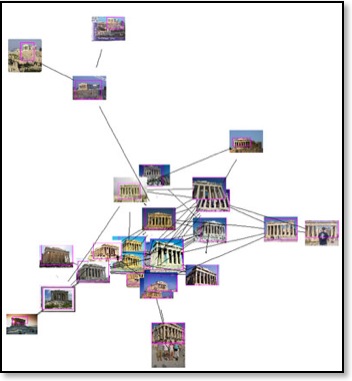Google
Google is going to find landmarks
08/01/09 10:38 Filed in: search
From
Scientific American:

While it's possible to search the Web for images, there's still no way of searching the images themselves. Google is hoping to change this through a research project that can match digital photos of certain famous landmarks with text descriptions of those landmarks (including their namesname and where they're located) without the need for a conventional search engine.
Google created its experimental landmark recognition engine by developing a list of targeted landmarks (such as the Eiffel Tower and the Acropolis in Athens) and finding GPS-tagged digital photos of those locations. The researchers then "taught" the recognition engine to identify specific landmarks by clustering different images of the same landmark (taken in different lighting and from different angles, for example).

While it's possible to search the Web for images, there's still no way of searching the images themselves. Google is hoping to change this through a research project that can match digital photos of certain famous landmarks with text descriptions of those landmarks (including their namesname and where they're located) without the need for a conventional search engine.
Google created its experimental landmark recognition engine by developing a list of targeted landmarks (such as the Eiffel Tower and the Acropolis in Athens) and finding GPS-tagged digital photos of those locations. The researchers then "taught" the recognition engine to identify specific landmarks by clustering different images of the same landmark (taken in different lighting and from different angles, for example).
Bing vs. Google
06/14/09 10:45 Filed in: search
I have been
researching a couple of topics lately, and getting
nowhere finding good information - one is whether or
not you could hook up a USB wireless modem to Airport
Extreme and use that for your wireless network modem.
I googled all kinds of things to try and find
information on that.
I decided today to try Bing and see what happened. First hit. Even with the word "airport" which often means planes, not Apple airport to google.
So then I tried my friend's name, which on google brings up a lot of his articles, but not his website. Bing brought up the website as the first hit.
I'm impressed, which is hard to be, since I am a curmudgeon about things Microsoft. I didn't think there would be much of a difference, but trying it with "known items that have been failing" impressed me.
I decided today to try Bing and see what happened. First hit. Even with the word "airport" which often means planes, not Apple airport to google.
So then I tried my friend's name, which on google brings up a lot of his articles, but not his website. Bing brought up the website as the first hit.
I'm impressed, which is hard to be, since I am a curmudgeon about things Microsoft. I didn't think there would be much of a difference, but trying it with "known items that have been failing" impressed me.
Ebook reader and format wars, nth edition
04/20/09 10:55 Filed in: ebooks
Mike Shatzkin says:
It is also critical to keep in mind that the ebook market for consumers has not happened yet! Publishers are seeing sales of about 1% of their revenue. I am a bit abashed about how over-optimistic I have been about ebooks for the past ten years (a by-product of having personally read more books on devices than on paper, by a factor of about 4 to 1, in the 21st century, and about 40 to 1 since I got my Kindle.) I can see ebooks getting to 7-10% of the units sold for consumer books in the next 3-to-5 years and I’m the optimist.
And with 85% of even that incipient market having not happened yet, most of which will be read on devices that haven’t been delivered yet (including future versions of Kindle, Sony Reader, iPhone, etc.) and, further with whole business models (subscriptions, book-of-the-month plans, bundling of titles together, offers by publishers to give ebooks away with print or audio books) which have hardly surfaced yet, we can only imagine what more changes we might see between now and then.
He goes on to discuss the strengths and weaknesses of Amazon, Apple, and Google in the market-to-be.
It is also critical to keep in mind that the ebook market for consumers has not happened yet! Publishers are seeing sales of about 1% of their revenue. I am a bit abashed about how over-optimistic I have been about ebooks for the past ten years (a by-product of having personally read more books on devices than on paper, by a factor of about 4 to 1, in the 21st century, and about 40 to 1 since I got my Kindle.) I can see ebooks getting to 7-10% of the units sold for consumer books in the next 3-to-5 years and I’m the optimist.
And with 85% of even that incipient market having not happened yet, most of which will be read on devices that haven’t been delivered yet (including future versions of Kindle, Sony Reader, iPhone, etc.) and, further with whole business models (subscriptions, book-of-the-month plans, bundling of titles together, offers by publishers to give ebooks away with print or audio books) which have hardly surfaced yet, we can only imagine what more changes we might see between now and then.
He goes on to discuss the strengths and weaknesses of Amazon, Apple, and Google in the market-to-be.